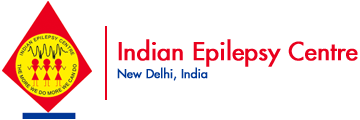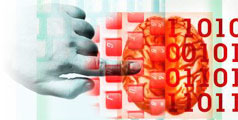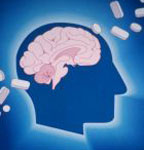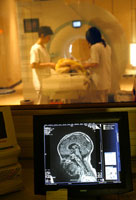
PLEASE CALL: 011-41614141
& 45695542
(Between 11:30 AM - 5:30 PM)

 |
FOR APPOINTMENTS PLEASE CALL: 011-41614141 & 45695542 (Between 11:30 AM - 5:30 PM) |
 |
Frequently Asked Questions On EpilepsyTREATMENT: Q: To what extent can drug treatment help in patients with epilepsy? A: There has been a significant improvement in the drug treatment of epilepsy in the last few decades. The world wide experience is that complete control of seizures can be expected with appropriate drugs in almost 75% of newly diagnosed, previously untreated patients of epilepsy. The choice of drugs mainly depends on the type of seizures in a given patient. Drug treatment should only be started when the diagnosis of epilepsy has been established beyond doubt. To begin with it is always better to start with a single most appropriate drug (monotherapy). It is not recommended that patients should be started with two or more anti-epileptic drugs (polytherapy). The drug chosen is usually introduced gradually, in small doses because most drugs have some side effects if these are introduced rapidly. The final maintenance dose is usually built up over a period of a few weeks. Q: How long the treatment should be continued? A: The duration of treatment is dependent upon many factors like the type of epilepsy, age of the patient, control of seizures etc. In most cases, however, the treatment is continued for a period of 3 years after achieving complete seizure control. The treatment should never be stopped suddenly and the decision to stop treatment must be taken by the doctor in-charge of the patient. Q: What are the main principles of drug treatment for epilepsy? A: The principles of drug treatment in epilepsy are:
Q: Why is it important to take anti-epileptic drugs regularly? A: The aim of taking anti-epileptic drugs is to obtain adequate control of fits. It is very important to maintain a constant level of the drugs in the brain to control seizures. In order to achieve that, a constant level of the drug in the blood is required. It is therefore, very important to take medicines regularly. Q: What is the effect of anti-epileptic drugs on behaviour? A: Most anti-epileptic drugs do not have any effect on the behaviour. Phenobarbitone (Gardenal or Luminal) and its related drug called Primidone (Mysoline) are known to cause over activity in about one third of the children who are treated with these drugs. Q: Can epilepsy be cured? A: Epilepsy can not be cured in the real sense of the term. Epilepsy is a disease like hypertension, asthma and diabetes mellitus. Seizures can be totally controlled in almost 75% cases with epilepsy. In some people, especially children the seizures never recur after stopping their anti-epileptic treatment. These people can be considered to be cured of their epilepsy. In addition, very few people can be cured of their fits by surgical means. Q: What is the risk of seizure recurrence after stopping anti-epileptic treatment? A: A number of factors are known to influence the risk of relapse of seizure after withdrawal of medications in patients who have been seizure free for 2-3 years while on treatment. In no individual case can the safety of anti-epileptic withdrawal be absolutely guaranteed. Usually, almost half the cases whose treatment is stopped go into complete remission. If a patient has epilepsy secondary to brain damage or partial seizures, the risk of seizure recurrence is much higher and in most such cases, the treatment should be continued for many more years even if the seizures are controlled. It is a common experience that among patients being considered for withdrawal of anti-epileptic drugs, recurrence of seizures is most common while the drugs are being withdrawn or soon after the withdrawal is completed. In our experience the maximum risk of seizures recurrence is within three months of the drug withdrawal. If a patient has no fits for 4 to 5 years after the drug withdrawal, then his/her chance of having recurrence of seizure is extremely small. Q: Should the anti-epileptic drug be discontinued during any other intercurrent illness? A: It is very common mistake to stop the anti-epileptic drug when the patient has fever or nay other intercurrent illness. The anti-epileptic drugs should never be stopped in such circumstances. If the patient vomits within an hour or so of taking the drugs, an extra dose can be given after some time. It must always be remembered that the medicines used in the treatment of the intercurrent illness can have some pharmacological interactions with the anti-epileptic drugs. It is always better to inform the treating physician about the patient’s dosage schedule of the anti-epileptic drugs so that necessary precautions can be taken. Q: What should be done if the patient forgets to take a dose of anti-epileptic drugs? A: It is not uncommon for many patients to forget to take a dose of their anti-epileptic medication once in a while. Very often the patient may not even remember if a dose was taken or not. In such a situation it is better to take an extra tablet within the same 24 hours period rather than risking the occurrence of seizure due to low levels of the drugs in patient’s blood. Q: Can a person with epilepsy and on treatment with anti-epileptic drugs take alcoholic drinks? A: An occasional drink or a glass of beer is unlikely to have any bad effect o a person who is on treatment with anti-epileptic drugs. However, it must be remembered that:
Q: What should be done if some one gets an epileptic fit on the road side or any where else? A: It is important to know what should NOT be done if some one is having a fit.
On the other hand, DO THE FOLLOWING:
Q: How frequently should a person with epilepsy visit the treating doctor? A: This is mostly an individual decision but if the epilepsy is well controlled, a check-up once in 3-4 months is enough. Persons who have poorly controlled seizures or are on multiple drugs may need to visit the doctor more frequently. In certain situations like epilepsy and pregnancy, epilepsy in the elderly and recurrent febrile convulsions more frequent visits may be required. Q: What is the effect of fits on the memory?
Q: Can seizures cause brain damage? A: A single brief seizure probably causes no permanent damage to the brain. Prolonged grand-mal seizures or even febrile convulsions can definitely damage the brain. In addition, seizures occurring one after the other without the patient becoming conscious in between two seizures, can also damage the brain. It is an accepted fact that any seizure lasting for 20 to 30 minutes can results in brain damage which is not secondary to the fit itself but results from the lack of oxygen supply to the brain during the prolonged fit. Next» INVESTIGATIONS |
Myths & Facts  |